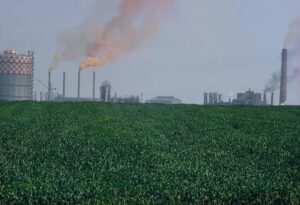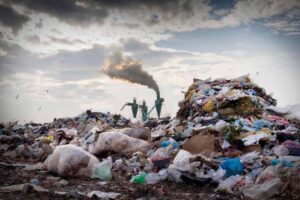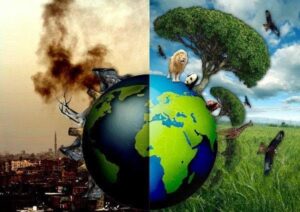Back to: Environmental Biology 100 Level
Welcome to class!
Hello brilliant learner! I’m so glad you’re here today because this topic is about us—humans—and how our actions affect the planet we live on. Our lesson is Human Impact on the Environment, and by the end of this class, you will understand how human activities shape the environment, both positively and negatively, and what can be done to reduce the harm.
Human Impact On The Environment
Think about a busy city like Lagos—cars honking, factories running, people buying and selling. Now imagine the waste, smoke, and noise produced every day. These activities show how humans interact with the environment, often causing changes. Some changes are helpful, but many are harmful.

What is Human Impact on the Environment?
Human impact on the environment refers to the ways human activities affect the natural world. These impacts can be positive (like tree planting) or negative (like pollution and deforestation).
Major Negative Human Impacts
Deforestation
Cutting down trees for timber, farming, and urban development.
Effects: Loss of forests, soil erosion, loss of wildlife habitats, and climate change.
Example: Clearing of rainforests in Cross River State for farming.
Pollution
Air Pollution: Smoke from cars and factories releasing harmful gases.
Water Pollution: Oil spills in the Niger Delta, dumping of waste into rivers.
Soil Pollution: Excess use of pesticides and improper waste disposal.
Overexploitation of Resources
Overfishing, overhunting, and excessive logging reduce species populations.
Example: Hunting bushmeat in Nigerian forests leading to fewer wild animals.
Urbanisation and Industrialisation
Building cities and factories leads to habitat destruction and waste accumulation.

Climate Change
Caused by burning fossil fuels and deforestation, leading to global warming, droughts, and floods.
Positive Human Impacts
Afforestation: Planting trees to restore forests.
Wildlife Conservation: Creating national parks and reserves.
Renewable Energy: Using solar, wind, and hydro power to reduce pollution.
Consequences of Negative Impacts
Loss of biodiversity.
Shortage of clean water and fertile soil.
Increased natural disasters like floods and droughts.
Health problems from pollution.
How to Reduce Human Impact
Reduce, reuse, and recycle waste.
Plant trees and support reforestation projects.
Use public transport or walk to reduce carbon emissions.

Support clean energy sources like solar and wind.
Summary
Human activities such as deforestation, pollution, and overexploitation negatively affect the environment. However, through actions like afforestation, renewable energy use, and conservation, we can reduce these impacts and protect the planet.
Evaluation
- Mention two negative human impacts on the environment.
- Give two examples of positive human actions to protect the environment.
- What is one consequence of deforestation?
Fantastic job today! You are now more aware of how our actions affect the Earth. Remember, you have the power to make positive changes for a healthier planet. Keep learning with Afrilearn—together, we can build a better future!
